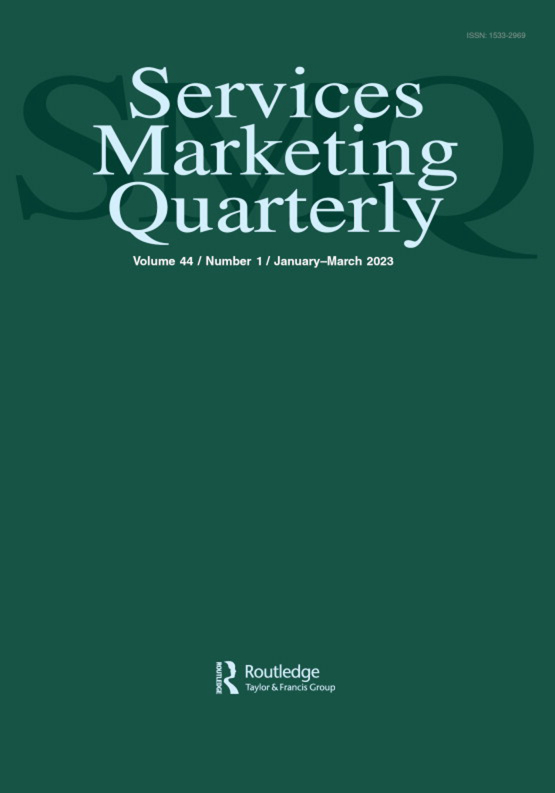Submit a Manuscript to the Journal
Services Marketing Quarterly
For a Special Issue on
Digital Transformation in Services Marketing: Bridging Technology and Customer-Centric Strategies
Manuscript deadline

Special Issue Editor(s)
Ricardo Godinho Bilro,
ISCTE - University Institute of Lisbon and Business Research Unit (BRU), Portugal
bilro.ricardo@gmail.com
Sandra Maria Correia Loureiro,
ISCTE - University Institute of Lisbon and Business Research Unit (BRU), Portugal
sandramloureiro@netcabo.pt
Digital Transformation in Services Marketing: Bridging Technology and Customer-Centric Strategies
Overview
The fast advancement of digital technologies, including artificial intelligence (AI), cloud computing, blockchain, the Internet of Things (IoT), and big data analytics, is revolutionising service ecosystems and reshaping the dynamics of customer-provider interactions (Loureiro et al., 2024). These technologies offer unprecedented opportunities to enhance operational efficiency, foster innovation, and create new business models in the service economy (Bresciani et al., 2021). At the same time, they challenge existing paradigms of value creation, customer engagement, and service design (Elia et al., 2024; Hoang et al., 2023).
A key area of interest lies in integrating digital transformation technologies with customer-centric strategies (Gupta & Ramachandran, 2021). These approaches prioritise understanding customer needs while leveraging digital tools to optimise services, personalise offerings, and enhance customer experiences and engagement. The rise of platform-based ecosystems further amplifies the interconnection of stakeholders, enabling collaborative value co-creation and the development of innovative solutions tailored to diverse customer segments (Manser Payne et al., 2021).
Despite the growing body of research on digital transformation, significant gaps remain in understanding its implications across different layers of service ecosystems, including customer experience personalisation, collaboration in service ecosystems, insufficient focus on customer-centric models, and the role of data spaces in fostering cooperation (Ciuchita et al., 2022; Kandil et al., 2024). Additionally, there is a need to explore how emerging technologies such as generative AI and digital twins can transform service delivery processes, reconfigure customer journeys, and redefine human-technology interactions.
This special issue aims to address these challenges by encouraging research investigating how digital transformation can bridge the gap between technological advancements and customer-centric strategies. It seeks to advance knowledge on the practical applications of digital technologies in creating superior customer experiences and driving innovation in service ecosystems.
Existing literature is calling for more research on this topic (Currie et al., 2024; Elia et al., 2024; Paul et al., 2024), emphasising the importance of both conceptual and empirical studies that offer insights into the interactions between customers and providers through digital technologies.
Scope of the special issue
This special issue explores the transformative role of digital technologies in bridging the gap between technology and customer-centric strategies in services marketing. The objectives of this special issue is twofold: (i) to investigate how digital transformation technologies, such as AI, IoT, blockchain, big data, and cloud computing, are reshaping service ecosystems and customer interactions, and (ii) to develop insights into how these technologies can be effectively integrated to enhance customer-centric strategies.
This special issue welcomes high-quality submissions examining the evolution of service delivery and customer experiences through digital transformation. Research may focus on diverse dimensions, such as the operational and strategic implications of technology-enabled services and the cognitive, emotional, or psychological impacts on customers and providers (e.g., Bilro & Loureiro, 2023; Chen & Girish, 2023; Pham et al., 2024). The scope includes interactions across different levels, such as customer experiences with AI-driven tools (e.g., chatbots, generative AI, smart assistants) (Heinonen & Sthapit, 2024; Singh & Malik, 2024) or collaborations within platform ecosystems involving multiple stakeholders. Submitted research should share a common focus on advancing the understanding of how digital transformation can align with the principles of customer-centricity to foster service ecosystems.
We encourage a wide range of research methodologies, including qualitative, quantitative, mixed methods, and data mining, to examine these themes from multiple perspectives. This diversity ensures a comprehensive exploration of digital transformation’s opportunities and challenges for services marketing.
Indicative list of topics
We invite contributions investigating the following topics, but not limited, within the context of services marketing:
· Integrating AI and Customer Experience
- Leveraging artificial intelligence to enhance customer interactions and satisfaction
- The role of AI in personalising service offerings
· Omnichannel Strategies in the Digital Era
- Developing seamless customer experiences across digital and physical touchpoints
- Challenges in implementing omnichannel approaches
· Data-Driven Personalization
- Utilising big data and analytics to tailor services to individual customer needs
- Balancing personalisation with data privacy concerns
· Customer Journey Mapping in Digital Contexts
- Techniques for mapping and optimising customer journeys in a digital landscape
- Impact of digital touchpoints on customer decision-making processes
· AI-Driven Service Innovations
- Exploring how AI can be leveraged to innovate and transform processes in service ecosystems
- Designing AI-based services that enhance value co-creation among stakeholders
· Digital Transformation in Service Ecosystems
- Examining the implications of digital transformation on interorganizational cooperation and platform ecosystems
- Strategies for developing public data spaces and related ecosystems
· Technology Adoption and Consumer Behaviour
- Investigating how new technologies (e.g., chatbots, virtual reality) influence consumer decision-making in service contexts
- Factors affecting data-sharing intentions and privacy concerns among consumers
· Emerging Technologies in Service Marketing
- The impact of blockchain, IoT, and mixed reality on service delivery and customer engagement
- Future trends and their potential implications for service marketing strategies
(for references list, please contact the Guest Editors)
Submission Instructions
We encourage submissions that offer theoretical insights, empirical research, and practical applications related to these themes.
Authors interested in contributing to this Special Issue should adhere to the general submission guidelines of the Journal, which are available on the journal’s official website. Submissions must conform to the journal’s formatting, style, and ethical standards.
Select the special issue title "Digital Transformation in Services Marketing: Bridging Technology and Customer-Centric Strategies" when submitting your paper to ScholarOne.
All submissions will undergo a rigorous double-blind peer-review process. For any inquiries about this special issue, please email the guest editors.
